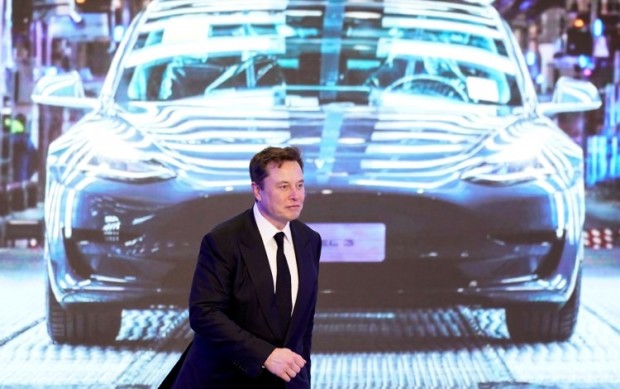
Tesla (TSLA) -) CEO Elon Musk unveiled a potential game-changing strategy for the EV carmaker late Wednesday, telling investors that the group is in early stage talks to license its full-self driving technology to a major automotive rival.
Expanding on a vision he has been articulating for Tesla over the past few years, Musk said he was "deeply honored" that carmakers such as Ford F, General Motors GM and Mercedes had signed-up to use the company's fast-growing network of vehicle chargers -- now pegged at around 15,000 -- but stressed that he wasn't looking to license that access.
However Musk noted Tesla is "very open to licensing our full self-driving software and hardware to other car companies.
"We are already in discussions with -- early discussions with a major OEM about using the Tesla FSD. So, we're not trying to keep this to ourselves," Musk said. "We're more than happy to -- to license it to others."
The FSD licensing plans provided perhaps the key surprise to an otherwise tepid second quarter earnings discussion, which was mostly focused on Tesla's efforts to defend profit margins amid an expected slowdown in September quarter production, an uncertain macro environment and ongoing EV price cuts.
Gene Munster, an analyst at Deepwater Asset Management and a long-time Tesla bull, thinks the licensing of FSD technology could generate as much as $20 billion in annual revenue within five years of the first agreement.
"If Tesla is successful at landing one OEM, the likelihood that other car makers jump on board is high. It would be a similar dynamic we’ve seen over the past month as seven car makers have signed up to use Tesla’s charging network," Munster said.
Tesla, which currently charges around $200 for its Basic Autopilot to FSD capability, could lower that price to $100 and, if it managed to gain a 25% U.S. market share, would generate $4 billion in new annual revenues.
"If in a decade, Tesla has a 10% share of the global auto market (their goal is closer to 20%), the company should be making just over $100B in operating income," Munster added. "While these targets are many years away, it illustrates the FSD licensing opportunity is meaningful and worth the wait."
Musk, for his part, isn't prepared to wait much longer, even as he described himself as "the boy who cried FSD" by over-promising and under-delivering on its potential.
Tesla now has data based on around 300 million miles of driving, a figure Musk said will "soon be billions of miles and tens of billions of miles", providing a huge competitive advantage for the company as it ramps-up investments in Ai and other technologies to harness its potential.
"I've been wrong in the past. I may be wrong this time (but) I think we'll be better than human by the end of this year," Musk said. "We see a clear path to full self-driving being 10 times safer than the average human driver."
Wedbush analyst Dan Ives, who carries an 'overweight' rating with a $350 price target on Tesla stock, describes Musk's strategy as a "golden vision" for the clean-energy carmaker that adds to the monetization of its proprietary technology.
"In a nutshell, we view Tesla where Apple was in the 2008/2009 period as Cupertino was just starting to monetize its services and golden ecosystem with the Street not seeing the broader golden vision at the time," Ives said.
Regulatory issues could blunt the rollout of FSD, however, both internally and with possible OEM customers.
The National Highway Traffic Safety Administration is currently investigation 16 different accidents involving the Tesla Autopilot system, and the current probe has reached the level of "Engineering Analysis", the second of two phases that would precede a full recall.
Tesla itself released an FSD software update in March, following an NHTSA recall of 362,758 Model S, Model X, Model 3, and Model Y vehicles, after it determined that the system ""allows a vehicle to exceed speed limits or travel through intersections in an unlawful or unpredictable manner that increases the risk of a crash."
Still, the fact that Tesla was content to warn that current margin pressures would continue into the back half of the year, and possibly beyond, suggest that the carmaker is looking to augment its drive for great market share with ancillary revenues.
Tesla's overall second quarter revenues were up 47.2% from last year to a record $24.5 billion, but its adjusted bottom line rose by less than half of that pace, as its automotive margin (excluding the sale of emissions credits) fell to 18.2%.
Musk explained that the value of a Tesla car "increases dramatically if it is actually autonomous", providing an incentive for the buyer and a recurring revenue stream for the manufacturer.
"The short-term variances in gross margin and profitability really are minor relative to the long-term picture," Musk told investors late Wednesday. "Autonomy will make all of these numbers look silly."
Action Alerts PLUS offers expert portfolio guidance to help you make informed investing decisions. Sign up now.







